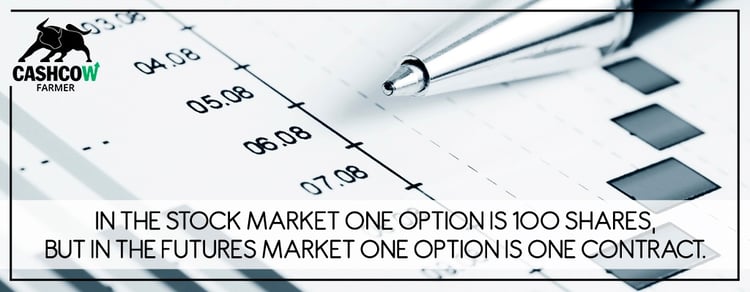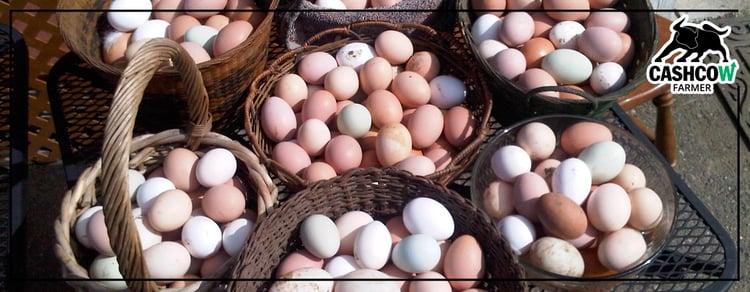Don't have time to read, click play above or subscribe to our podcast on itunes.
Hope is not a good grain marketing strategy.
The price risk you run when you store grain doesn’t go away, even if you hold your breath. Even though harvest is over, a lot of the numbers are coming out. If you’re already tight with your break-even cost of production, you want to make sure you’re not losing more money as that grain sits at the elevator.
How do you this? By developing a specific risk management strategy—or multiple strategies.
Here are seven strategies you can use to hedge stored grain.
1) Hire At Least 2 Professional Grain Marketing Consultants
Farmers in general are really bad at marketing grain.
It’s not an insult; it’s the reality of your job. You’re busy, and you don’t have time to analyze markets, weather forecasts, etc.
But you need to invest in grain marketing because it’s the most important decision you’re going to make year in and year out. Hire a couple of grain marketing consultants. By a quick Google search, you’ll find a whole slew of them.
I say two because everyone reads the market differently, so it’s good to have multiple perspectives. You could hire 10 if you want, but keeping up with that many advisers might be a little overwhelming.
2) Have a Plan With Price Goals

Before you even put grain in the bin, have a plan to get rid of it.
You should have a general idea of when you can get to market, so keep tabs on things such as the basis on those contracted months, and build a plan.
Your first priority is knowing what it cost you to produce your grain. That will inform you on what to do from there.
Talk with your grain consultants about this. Usually, you can call them and speak to them directly.
As Benjamin Franklin said, “If you don’t have a plan, you’re planning to fail.”
3) Futures Contracts
Futures contracts are just instruments. They were essentially developed to hedge risk in price. With them, you can lock in your entire operation at a certain price.
One futures contract will cover 5,000 bushels of corn or soybeans. Make sure you know what you’ve got in the bin. Cash Cow Farmer is a tremendous help for this and can give you an exact number when you’re counting bushels.
Once you figure out your bushels, select how many contracts you want to work with. You’re either buying or selling a contract; talk to your consultants to know which side you want to be on to hedge your risk.
4) Options on Futures Contracts
Options are a little bit different from regular futures contracts.

One option is worth 5,000 bushels just like a regular futures contract. But there are three parts to an option:
- Is it a put or call? - Meaning long or short.
- Strike price - The price at which the option can be executed to buy or sell the contract.
- Time - Probably the most important aspect. For example, if you try to buy a put option on corn for one year out, it’ll be expensive. There’s so much time between when you buy and when it executes the strike price. (Note: there are short-dated options available now.)
Options can be extremely valuable. My favorite thing to do with them is sell them, because they lose value every day that they get closer to when they execute.
I’m not greedy about options: I definitely don’t sell my whole crop with them. But it’s a nice strategy for protection and for possibly pulling 20 or 30 cents out of the market for some of those bushels.
If your head is spinning a little, don’t worry. Do your homework and talk to your consultants about options, because if you know what you’re doing they can bring you substantial risk protection.
5) Basis Management
Basis is all locally based. The more you’re in tune with your local area, the better. Chat with your local co-op as much as possible because they’ll communicate what’s going on with the basis markets.
Pick a target, and execute the month you can deliver at a good basis. Basis contracts are nice because once you have one, you normally don’t get charged storage.
6) Use Multiple Strategies

You don’t want all your eggs in one basket.
Selling options is great, but I wouldn’t do it on everything. Break your production down in tenths or quarters and pick a strategy for each of them. Use a futures contract for some, a cash contract for others, and so on.
Again, your consultants come in handy here.
7) Avoid Emotion—Keep Calm and Hedge On
The worst thing is when farmers double their losses by panicking.
It happens like this: a farmer has grain in the bin, and he’s sold futures for $3. The grain goes up to $3.50; he sees that he’s lost a ton of money on paper, panics, and sells his futures contracts but doesn’t deliver his grain.
If he would have sold his grain, the whole deal would have ended up a wash. But if he doesn’t sell and the futures comes back down to $3, and then he sells, he ends up with $2.50 for his grain. This is compounding a loss.
Many farmers have trouble with this because they deal on emotion. If you’re going to sell contracts, match those with cash sales to balance it out—always. Make it a calculated head decision instead of a wavering, emotional one.
Conclusion
If you’re interested in this information and having a live Q&A with me, I’d be happy to go over grain-hedging strategies in way more detail. If you could leave a comment or email me, I’ll get back to you and set something up!
Cash Cow Farmer was created to keep you from leaving a single dollar of profit on the table. Give it a look to learn more about how Cash Cow optimizes your operation!
To learn more about the Cash Cow Farmer program, including software and consulting, give us a ring!




